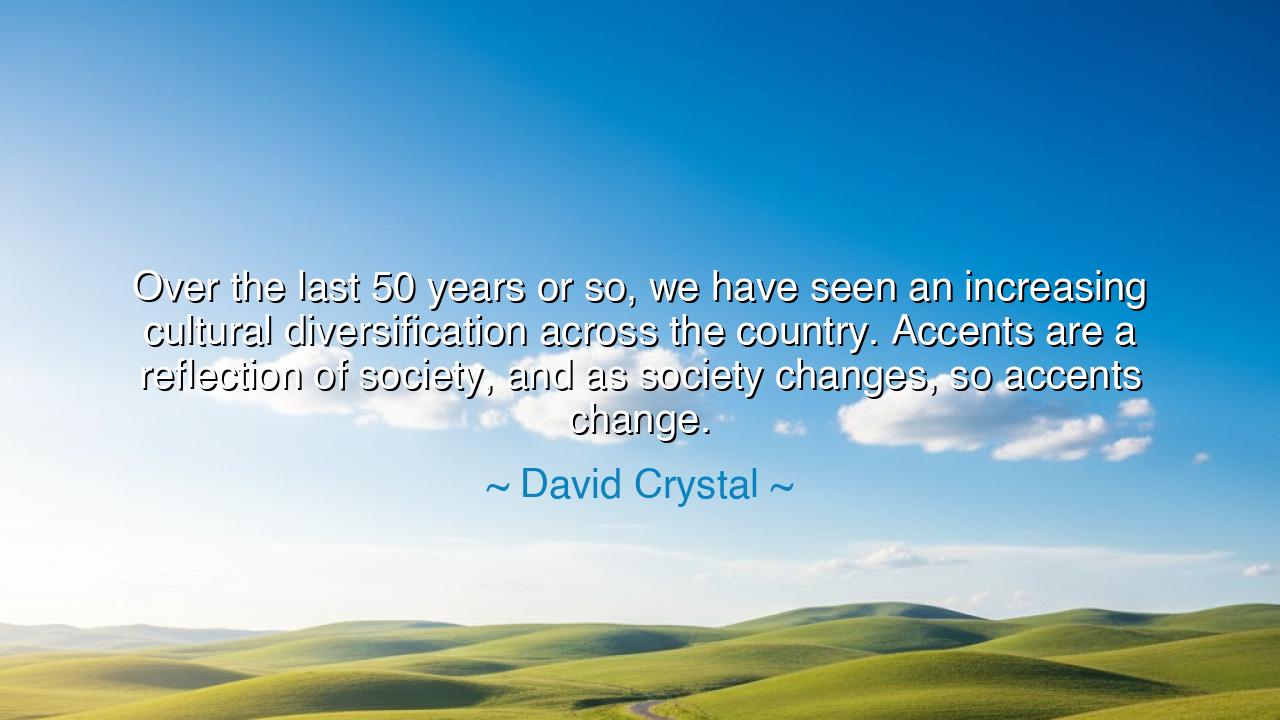
Over the last 50 years or so, we have seen an increasing cultural
Over the last 50 years or so, we have seen an increasing cultural diversification across the country. Accents are a reflection of society, and as society changes, so accents change.






The wise linguist David Crystal, master of the study of language, gave us this profound observation: “Over the last 50 years or so, we have seen an increasing cultural diversification across the country. Accents are a reflection of society, and as society changes, so accents change.” In these words he unveils a truth both subtle and powerful—that the voices of a people are not fixed in stone, but living mirrors of their history, their migrations, their struggles, and their triumphs.
For what is an accent but the sound of identity? It carries within it the echoes of ancestors, the imprint of lands, and the shaping of community. When society shifts—when new peoples meet, when cultures intertwine, when old barriers fall—the accent shifts with it, like a river carving a new course through changing terrain. To hear the voice of a nation is to hear its history, not in books alone, but in the very rhythm of speech.
History testifies to this eternal truth. When the Roman Empire expanded across Europe, Latin flowed into the tongues of many peoples, reshaping their speech for centuries to come. From that mingling arose the Romance languages—French, Spanish, Italian—each born of the union of empire and local tradition. So too, when the British Empire spread across the globe, the English tongue traveled with it, but it did not remain unchanged. It blended with the voices of India, Africa, America, and the Caribbean, each region molding it into a new sound, each accent a monument to cultural encounter.
In our modern age, Crystal speaks of the last fifty years, when the world has grown smaller through migration, travel, and communication. Cities have become crossroads of humanity, where many tongues are heard, and accents shift more swiftly than ever before. In London, Birmingham, New York, Toronto, and countless other places, one hears the rise of new hybrid voices—accents shaped by the mingling of Caribbean, South Asian, African, European, and native traditions. Each voice is a living testimony to cultural diversification, to the ever-changing face of society.
The meaning of Crystal’s words reaches beyond linguistics; it is a meditation on identity itself. For if accents change with society, then we too are never fixed—we are always in motion, always evolving as we encounter others. The voice is the bridge between the self and the community, and as communities change, so does the self. To despise new accents is to despise change itself; to embrace them is to embrace the living growth of humanity.
The lesson for us is profound: do not fear the transformation of language, for it is proof of life. Where there is no change, there is death; where there is change, there is vitality. Celebrate the richness of new voices, for they carry stories of struggle and resilience. Each accent is a thread in the vast tapestry of society, and as the tapestry expands, it grows more beautiful in its diversity.
Practical wisdom flows: listen with respect to the voices around you. Do not mock the stranger’s accent, for in it lies the song of another world. Teach children that accents are not weaknesses but treasures, reminders that society is alive, dynamic, and inclusive. And in your own speech, remember that you too carry history upon your tongue, a reflection of where you have come from and where humanity is going.
So let David Crystal’s words echo like a chime: “Accents are a reflection of society, and as society changes, so accents change.” Let them remind you that language is the soul of a people in motion. To honor it is to honor the past, the present, and the future woven together. And as you listen to the voices of the world, may you hear not division but harmony, not decay but transformation, not chaos but the living music of humanity itself.






AAdministratorAdministrator
Welcome, honored guests. Please leave a comment, we will respond soon